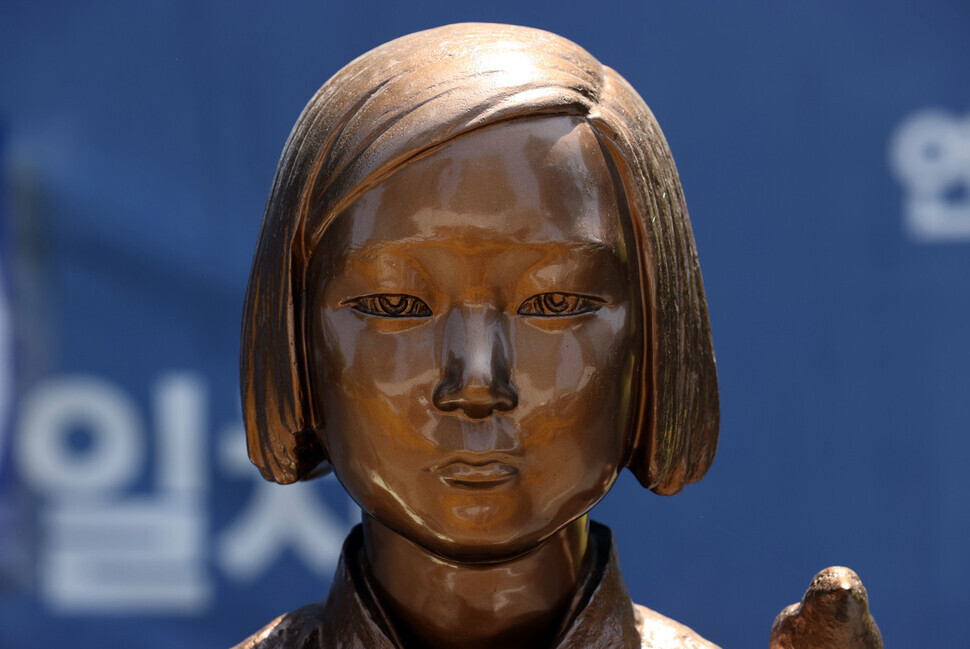hankyoreh
Links to other country sites 다른 나라 사이트 링크
[Editorial] Court’s dismissal of "comfort women" lawsuit disregards victims' dignity

A damages lawsuit filed by surviving "comfort women" was rejected by a South Korean court on Wednesday. The court found that it didn't have the legal authority to hold the Japanese government responsible for the system of military brothels operated by the Japanese imperial army in World War II.
This ruling contradicts a decision in January in which another South Korean court ordered Japan to pay each of the victims 100 million won (US$89,591).
In the previous ruling, the court sought to achieve justice by holding the Japanese empire responsible for crimes against humanity. But in this ruling, the court was too timid, focusing on formal issues such as the conventions of international law.
The chief issue in the trial was "sovereign immunity," or the principle that the courts of a given country cannot try the actions of another government. In the earlier decision, the court said that crimes against humanity – such as the coercive recruitment of the comfort women – represent an exception to sovereign immunity. But this court declined to grant such an exception, citing a majority opinion at the International Court of Justice.
Customary international law necessarily reflects a world order that's dominated by major powers. Those principles are limited in their ability to handle the comfort women issue from the victims' perspective.
While Italian and Greek courts rejected sovereign immunity in rulings about human rights violations perpetrated against their citizens by Nazi Germany, the International Court of Justice overturned those rulings and ruled in favor of Germany.
But since human rights and justice are gradually gaining international recognition as universal values, the court disregarded the fact that the efforts of various countries can bring about change even to customary international law.
Rather than being caught up in the formal framework of international law, the comfort women issue should be judged in light of the principle of human dignity, which is declared to be the preeminent value by the South Korean constitution and by international human rights law.
In its emphasis on the constitutional principle of respecting international law, the court seems to have undervalued the need to restore the victims' dignity. It's also hard to credit the court's view that the humiliating comfort women agreement signed by the government of Park Geun-hye on Dec. 28, 2015, can actually provide a remedy for the victims.
The court said that "the solution to the comfort women issue must come through the domestic and international efforts of the South Korean and Japanese governments," but that sounds fatuous given the Japanese government's attitude.
Efforts to memorialize comfort women records as a Memory of the World have been jeopardized by recent changes to UNESCO's rules put into effect at Japan's request, and Japanese history textbooks are erasing references to the compulsory nature of the comfort women system in defiance of the Japanese government's own Kono Statement, issued in 1993.
To ensure that the historical record and the international community understand that the comfort women system fundamentally represented wartime sexual violence that trampled on the victims' humanity, we need not only diplomatic efforts but also manifest rulings by the courts. We hope that this ruling will be corrected by the high court as it recalls the judiciary's role as the "last bastion of human rights."
Please direct comments or questions to [english@hani.co.kr]

Editorial・opinion
![[Editorial] Does Yoon think the Korean public is wrong? [Editorial] Does Yoon think the Korean public is wrong?](https://flexible.img.hani.co.kr/flexible/normal/500/300/imgdb/original/2024/0417/8517133419684774.jpg) [Editorial] Does Yoon think the Korean public is wrong?
[Editorial] Does Yoon think the Korean public is wrong?![[Editorial] As it bolsters its alliance with US, Japan must be accountable for past [Editorial] As it bolsters its alliance with US, Japan must be accountable for past](https://flexible.img.hani.co.kr/flexible/normal/500/300/imgdb/original/2024/0417/6817133413968321.jpg) [Editorial] As it bolsters its alliance with US, Japan must be accountable for past
[Editorial] As it bolsters its alliance with US, Japan must be accountable for past- [Guest essay] Amending the Constitution is Yoon’s key to leaving office in public’s good graces
- [Editorial] 10 years on, lessons of Sewol tragedy must never be forgotten
- [Column] A death blow to Korea’s prosecutor politics
- [Correspondent’s column] The US and the end of Japanese pacifism
- [Guest essay] How Korea turned its trainee doctors into monsters
- [Guest essay] As someone who helped forge Seoul-Moscow ties, their status today troubles me
- [Editorial] Koreans sent a loud and clear message to Yoon
- [Column] In Korea’s midterm elections, it’s time for accountability
Most viewed articles
- 1[Column] The clock is ticking for Korea’s first lady
- 2[Editorial] When the choice is kids or career, Korea will never overcome birth rate woes
- 3S. Korea, Japan reaffirm commitment to strengthening trilateral ties with US
- 4Korea, Japan jointly vow response to FX volatility as currencies tumble
- 5[Guest essay] How Korea turned its trainee doctors into monsters
- 6Japan officially says compensation of Korean forced laborers isn’t its responsibility
- 7US exploring options for monitoring N. Korean sanctions beyond UN, says envoy
- 8Gangnam murderer says he killed “because women have always ignored me”
- 9[Editorial] As it bolsters its alliance with US, Japan must be accountable for past
- 10‘Right direction’: After judgment day from voters, Yoon shrugs off calls for change